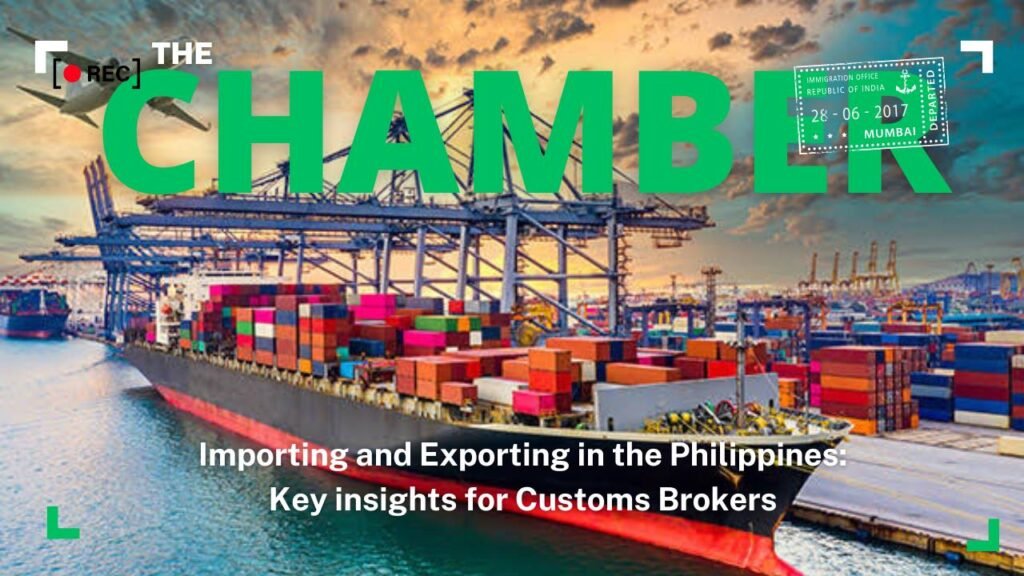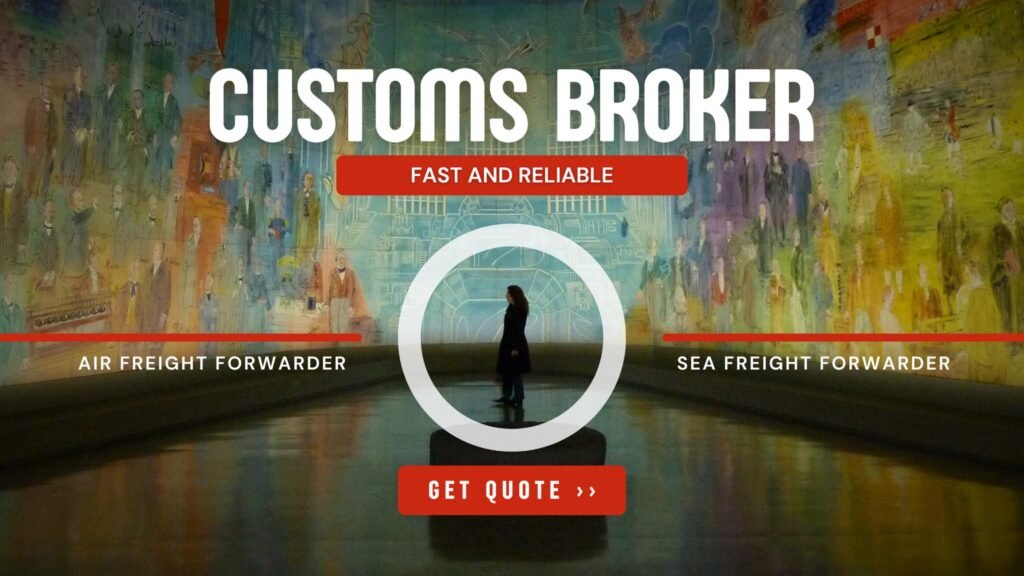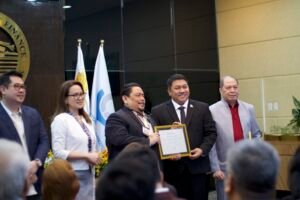Customs brokers play a vital role in international trade by bridging businesses and government agencies, ensuring compliance and efficient customs procedures. Moreover, this blog aims to provide key insights specifically designed for customs brokers involved in Philippine import and export activities. Importing and exporting are essential drivers of the Philippine economy, significantly contributing to the nation’s growth and development.
The Philippines actively engages in import and export trade, historically emphasizing export-oriented sectors to strengthen its economic standing internationally. For example, key export products include electronics, semiconductors, machinery, apparel, coconut oil, and various fruits, showcasing the country’s diverse production capabilities. On the other hand, the Philippines imports raw materials, intermediate goods, capital items, and consumer products to support industries and domestic needs. Despite having a strong export sector, the country heavily relies on imports to sustain its economy and fulfill various demands.
Customs Brokers, Import and Export Landscape
Before exploring detailed insights, it’s important to understand the export landscape shaping trade activities in the Philippines. Positioned strategically in Southeast Asia, the Philippines benefits from a growing economy and strong trade partnerships, creating opportunities for international businesses. Additionally, the country handles a variety of products, ranging from raw materials to finished goods, highlighting its economic diversity. Therefore, efficient customs brokerage services are vital for ensuring smooth compliance with regulatory requirements and facilitating seamless trade operations.
Navigating Customs Regulations
Customs brokers are responsible for managing complex customs regulations that govern both import and export operations, ensuring effective compliance globally. Their role requires expertise in tariff classifications, valuation methods, duty rates, and trade agreements that influence the international movement of goods. Additionally, by staying updated on regulatory changes and using their specialized knowledge, customs brokers help clients streamline processes. This approach ensures goods move efficiently, adhere to legal requirements, and avoid unnecessary delays or costly penalties.
Subscribe to the MyCCBI365 newsletter
Building Strong Relationships
Customs Brokers Should Embrace Technology
In the modern digital era, technology significantly transforms customs brokerage operations, making efficiency and accuracy more achievable than ever before. Customs brokers must adopt innovations like electronic customs clearance systems, automation tools, and data analytics platforms to optimize their workflows effectively. Furthermore, by utilizing these technologies, brokers can simplify processes, reduce paperwork, prevent errors, and offer real-time shipment tracking. This proactive approach ultimately enhances customer satisfaction and ensures smoother, more reliable trade operations.
Navigating Tariff Preferences
The Philippines participates in various international trade agreements and tariff preference schemes designed to encourage trade liberalization and economic cooperation globally. Customs brokers must stay updated on these agreements and understand their impact on importers and exporters. By utilizing preferential tariff rates and duty exemptions available through these agreements, brokers help clients optimize supply chains and reduce costs while ensuring full compliance with trade regulations.
Conclusion: Customs brokers in the Philippines are essential to facilitating smooth international trade and ensuring goods move seamlessly across borders. By mastering customs regulations, fostering strong relationships, embracing technology, and leveraging trade agreements, brokers provide critical support to businesses involved in importing and exporting. As the trade environment evolves, customs brokers must stay flexible, innovative, and committed to delivering exceptional service in this vital field.
General FAQs
A customs broker in the Philippines acts as a liaison between importers/exporters and the Bureau of Customs (BOC). Their role is critical in ensuring that goods comply with local regulations, clearing shipments through customs, and paying applicable duties and taxes. Specific responsibilities include:
- Customs Declarations: Filing accurate Import Declarations (Customs Entries) on behalf of clients, ensuring that all necessary documents are submitted to the Bureau of Customs (BOC) for clearance.
- Classifying Goods: Ensuring that goods are correctly classified under the proper Harmonized System (HS) code, which determines the applicable tariffs, duties, and taxes.
- Duty and Tax Payments: Ensuring that import duties, taxes (e.g., VAT, excise taxes), and other customs-related fees are paid promptly.
- Customs Compliance: Keeping clients compliant with Philippine customs laws, including following up on special permits (e.g., for regulated goods), managing import/export licenses, and adhering to local import quotas.
- Handling Customs Inspections: Coordinating the inspection of goods, if required, and ensuring that all paperwork is in order to prevent delays.
By handling these tasks, customs brokers help businesses avoid costly mistakes, delays, fines, and penalties, while also facilitating smoother logistics and trade operations.
Customs brokers can reduce costs and minimize penalties for businesses by:
- Optimizing Tariff Classification: Properly classifying goods can lower import duties. Brokers use their expertise to ensure that goods are classified under the correct HS code, which can significantly reduce costs and avoid overpaying on duties.
- Minimizing Errors in Documentation: Brokers help ensure that all import/export documentation is accurate, complete, and filed on time. Mistakes or missing documents (e.g., incorrect invoice details or missing import permits) can result in penalties or shipment delays.
- Advising on Trade Agreements: By leveraging Free Trade Agreements (FTAs) or Preferential Trade Agreements (such as the ASEAN Free Trade Area (AFTA)), customs brokers can help businesses reduce or eliminate duties on certain products.
- Ensuring Timely Payments: Brokers ensure that import duties and taxes are paid promptly, reducing the risk of fines for delayed payments or non-compliance with tax regulations.
- Avoiding Compliance Issues: Brokers stay up-to-date with changing regulations and can guide businesses in ensuring compliance with customs laws, helping avoid penalties for violations such as misdeclarations, undervaluation, or incorrect tariff classifications.
By navigating these areas with expertise, customs brokers can minimize unnecessary costs and protect businesses from costly customs violations.
Customs brokers in the Philippines face several challenges in the import-export process, including:
- Frequent Regulatory Changes: Customs regulations and tariff codes often change, which can create confusion and require constant updates to ensure compliance.
- Solution: Brokers need to stay informed through ongoing training, monitoring updates from the Bureau of Customs (BOC), and subscribing to industry news. Building relationships with regulatory bodies and attending trade seminars can also help brokers stay ahead of changes.
- Complex Documentation Requirements: The documentation required for customs clearance is extensive and can be challenging to navigate, especially for first-time importers or exporters.
- Solution: Having a clear checklist for required documents and utilizing digital tools (like BOC's e2m system for filing declarations) can simplify the process. Brokers can also provide clients with templates and guidelines to ensure all documents are in order.
- Customs Inspections and Delays: Random or targeted inspections can delay shipments, especially when goods are flagged for high-risk categories (e.g., electronics, perishables, or pharmaceuticals).
- Solution: Brokers should ensure that all documentation is accurate and complete, and they can work proactively with the BOC to resolve any issues arising from inspections. Building good relationships with Customs officers can also help expedite the process.
- Dealing with Non-compliance and Fines: Importers who fail to comply with Philippine customs laws face heavy fines and penalties, and brokers must manage the legal risks for their clients.
- Solution: Custom brokers should educate their clients about the importance of compliance, conduct regular audits, and provide pre-clearance consultations to ensure all aspects of the importation process are correctly handled.
- Tariff and Tax Calculation Issues: Miscalculating duties and taxes is a common problem, especially with complex goods that have multiple components or special tax rates.
- Solution: Brokers must be meticulous in tariff classification and consult with the BOC when in doubt. Using modern tariff calculation tools and staying updated with the latest rates can also prevent errors.
By anticipating these challenges and implementing proactive strategies, customs brokers can enhance their efficiency and minimize disruptions for their clients.
Customs brokers in the Philippines stay updated with the latest regulations, trends, and customs policies through a combination of:
- Government Resources: Regularly checking the Bureau of Customs (BOC) website, official gazettes, and newsletters to stay informed about regulatory changes and new policy announcements.
- Training and Certification: Attending industry seminars, workshops, and webinars hosted by organizations such as the Customs Brokers Association of the Philippines (CBAP). Additionally, brokers must maintain their licensing through continuous professional education and certifications.
- Industry Associations: Active participation in industry groups such as the Philippine Exporters Confederation, Inc. (PHILEXPORT) or the Philippine International Seafreight Forwarders Association (PISFA) allows brokers to network with peers and stay informed about best practices, market trends, and new rules.
- Consulting with Experts: Brokers may also work with legal experts, trade consultants, or even the BOC to clarify complicated issues and interpret new regulations.
- Customs System Updates: Monitoring updates to the BOC's e2m system, which is the official system for filing customs declarations and tracking shipments, allows brokers to stay abreast of new digital tools and compliance requirements.
By leveraging these resources, brokers can ensure they remain at the forefront of Philippine customs regulations, providing high-quality service to their clients.
Working with a customs broker in the Philippines offers several key benefits to businesses:
- Expert Guidance and Compliance: Customs brokers ensure that businesses remain compliant with complex and ever-changing customs regulations. Their expertise reduces the risk of costly errors or penalties.
- Faster Customs Clearance: Brokers help speed up the customs clearance process by ensuring all documentation is complete and accurate, reducing delays and ensuring that goods move swiftly through Customs.
- Cost Savings: By properly classifying goods, leveraging trade agreements (such as ASEAN or GSP), and optimizing duty payments, brokers can help businesses save on import duties and taxes. They also avoid costly fines and delays.
- Risk Mitigation: Brokers manage the compliance risks of international trade by ensuring that goods are imported legally, reducing the chances of shipment seizures or fines from Customs.
- Focus on Core Business: By outsourcing the customs process to a broker, businesses can focus on their core operations, such as production, sales, and marketing, while leaving the complexities of customs procedures to the experts.
Overall, customs brokers help businesses navigate the complexities of international trade, ensuring that shipments are processed efficiently and cost-effectively while avoiding common pitfalls in the customs clearance process.









